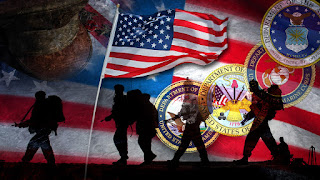November 11, or what has come to be known as Veterans Day, was originally set as a U.S. legal holiday to honor Armistice Day - the end of World War I, which officially took place on November 11, 1918. President Woodrow Wilson honored the first commemoration of Armistice Day with the following words: "To us in America, the reflections of Armistice Day will be filled with solemn pride in the heroism of those who died in the country’s service and with gratitude for the victory, both because of the thing from which it has freed us and because of the opportunity it has given America to show her sympathy with peace and justice in the councils of the nations..."
In 1954, Congress, at the urging of the veterans service organizations, struck out the word "Armistice" and inserted the word "Veterans." With the approval of this legislation on June 1, 1954, November 11 became a day to honor American veterans of all wars.Between 1968 and 1975, Veterans Day was moved around on the calendar, sometimes even appearing on the last Monday of October. Finally on September 20, 1975, President Gerald R. Ford signed a law which returned the annual observance of Veterans Day to its original date of November 11, beginning in 1978.
Veterans Day continues to be observed on November 11, regardless of what day of the week on which it falls. The restoration of the observance of Veterans Day to November 11 not only preserves the historical significance of the date, but helps focus attention on the important purpose of Veterans Day: A celebration to honor America's veterans for their patriotism, love of country, and willingness to serve and sacrifice for the common good.






























































No comments:
Post a Comment